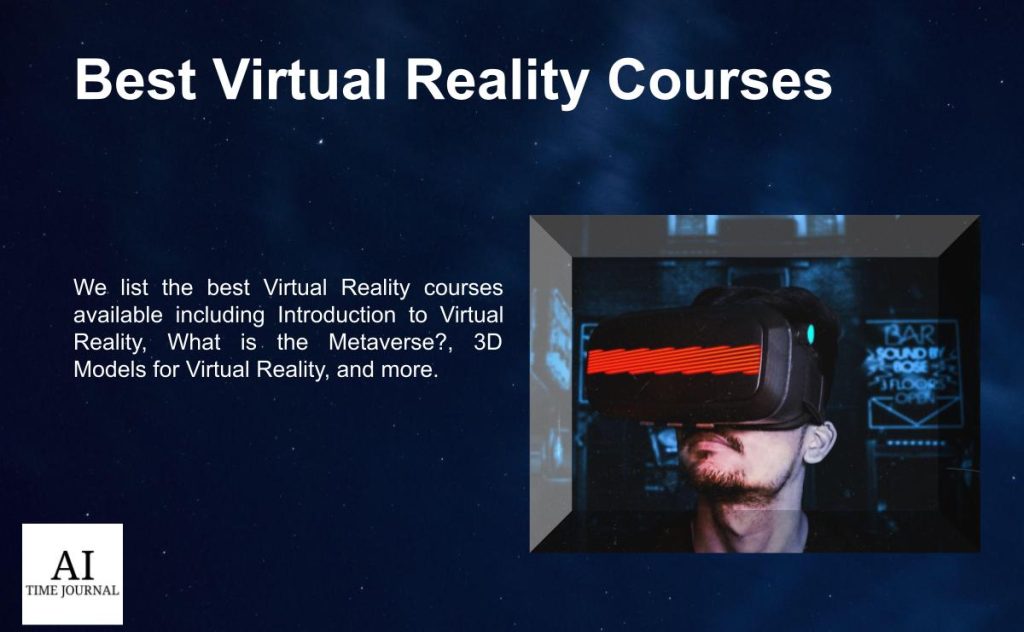
Best Virtual Reality Courses (2023)

The concept of virtual reality (VR) can be traced back to as early as 1968 but has just recently become more mainstream. Up until recently, VR has mostly been associated with gaming and entertainment. As technology continues to evolve we are discovering more ways to incorporate VR into different industries.
Virtual reality has become increasingly important in a variety of fields including healthcare, education, and tourism. More businesses are adopting VR as a way to market themselves and their products. As VR becomes more accessible, it will become more prevalent in our day-to-day lives. Having a fundamental understanding of virtual reality will help individuals and businesses alike adapt to an ever-evolving tech landscape.
This article will discuss some of the best courses to help you understand everything related to VR, from the history and technology to the challenges and future applications of virtual reality. These courses are offered by the online learning platform, Coursera, and each course issues a shareable certification upon completion of the course.
For more like this, check out these relevant articles: How AI and the Metaverse Work Together and What is Web 3.0 and Why is it a Leading Tech Trend?
Introduction to Virtual Reality
Introduction to Virtual Reality is a course offered by Goldsmith’s, University of London. This course is instructed by Professor Marco Gillies, who is an expert in the field of virtual reality, and Dr. Sylvia Xueni Pan, whose work in virtual reality has been featured in various media outlets including BBC Horizon and the New Scientist Magazine.
This introductory course is intended for those who are new to virtual reality (VR) and its related concepts. It covers the history of VR, applications, challenges facing the technology, and the hardware most commonly used to experience VR: the Oculus Rift and HTC Vive. Students will learn to design, test, and implement virtual reality using Unity, one of the most popular platforms for VR game production.
Introduction to Virtual Reality has been praised for its versatility. Reviewers have stated that both beginner and intermediate-level students can benefit from the content of the course. Additionally, for those with an interest in social science, this course explores the psychology behind VR and discusses related theories.
What is the Metaverse?
This Metaverse-focused course is offered by Meta and is taught by Meta experts. It takes beginners through the foundations of the Metaverse and teaches them key concepts such as
- NFTs
- Content creation
- Game engines
- Extended Reality
- And blockchain and cryptocurrency
Students will also discover new ways to connect, how the Metaverse applies to businesses and professionals, as well as the future of the Metaverse. This course is offered at no cost to students and provides professional certification that helps students differentiate themselves from others in the job market.
Numerous five-star reviews have called this impactful and insightful for the future of humanity and virtual reality. Rated by over 30,000 certified students, this course is a popular choice for those looking for a more complete understanding of how the Metaverse will be integrated with society in the future.
Intro to AR/VR/MR/XR: Technologies, Applications, Issues
This course provides a comprehensive understanding of the differences between augmented, virtual, mixed, and extended reality. It discusses the potential futures and limitations of these technologies and prepares students to critique the use of VR and AR in different applications. After completing this course, students will be able to:
- Differentiate between VR, AR, MR, and XR
- Understand the strengths and weaknesses facing the practical application of VR and AR
- Outline the XR technology landscape
- Strategically incorporate XR into new programs
Intro to AR/VR/MR/XR is offered by the University of Michigan and is taught by Dr. Michael Nebeling, an Assistant Professor in the School of Information. Dr. Nebeling leads the Information Interaction Lab, where individuals explore tools and methodologies that help them to interact and understand information better.
With more than 200 positive reviews, students have listed this course as perfect for those who have not yet been immersed in the world of VR/AR/MR/XR but would like to break into it.
VR and 360 Video Production
VR and 360 Video Production is a course offered by Google AR & VR, one of the biggest players in the virtual reality game. The course is instructed by Google’s knowledgeable VR experts and aims to equip students with the tools and skills needed to create their first VR project.
This course will take students through each step in the creative process such as preproduction, production, postproduction, and publishing. In addition to video production, students will learn about Camera+ and 360-degree video and how they fit into the world of VR.
The course only takes approximately 13 hours to complete. Students love this course for being very easy to follow and complete, making it an excellent choice for anyone looking to learn these skills.
3D Models for Virtual Reality
3D Models for Virtual Reality is another course offered by the University of London. Also taught by Dr. Sylvia Xueni Pan, this course is a part of a larger Virtual Reality Specialization that students can complete on Coursera.
This course will teach students the basics of 3D graphics and design, including the creation of objects and how to use those objects to establish a cohesive environment. It also covers concepts such as texturing techniques to make objects appear more realistic and audio to complete your VR environment are covered throughout the course. The course culminates in a VR project where students will be able to create their own VR scene using Unity3D.
Reviews have stated that this course is essential for creatives in the VR field and sufficiently equips them for further development. Some experience with 3D modeling software will help students excel in this course and an intermediate understanding of related concepts is key.
This content was originally published here.


